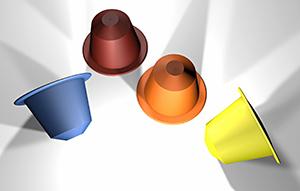The trouble with tiny coffee cups

Reporters found that “a Nespresso® capsule contains 5 grams of coffee, so it costs about $51 a pound. And the Folgers®, with 8 grams per capsule, works out to more than $50 a pound.
by Mary Budinger —
Love those convenient single-serve cups of coffee or tea made with the new style of individual brewing machines, first launched by Keurig®? Well, think again.
Turns out we threw away so many of those convenient single-serve packages last year that, if assembled like a daisy chain, they would have wrapped around the planet 10-1/2 times. And we are not talking about something recyclable here. The vast majority of those cups are made with #7 composite plastic, which is not recyclable in most places.
Writers for Mother Jones magazine looked into it and were told “the #7 plastic used in K-Cups® is BPA-free, safe and ‘meets or exceeds applicable FDA standards.’” But new evidence suggests that even non-BPA plastics can test positive for estrogenic activity. One concern with this plastic mix is the presence of polystyrene, which contains the chemical styrene, a possible carcinogen. Styrene can wreak havoc on the nervous systems of those handling it, according to the Centers for Disease Control and Prevention.
The New York Times calculated the cost of this single-cup convenience, and it is not tiny. Reporters found that “a Nespresso® capsule contains 5 grams of coffee, so it costs about $51 a pound. And the Folgers®, with 8 grams per capsule, works out to more than $50 a pound. That is even more expensive than all but the priciest coffees sold by artisanal roasters, the stuff of coffee snobs.”
Meanwhile, the price of coffee had dropped last year, but the price of arabica coffee futures, the type used primarily in roast and ground brews, went up in early 2014 due to a drought in Brazil.
Sources: Mother Jones magazine, March 19, 2014 and The New York Times, March 14, 2014.
Mary Budinger is an Emmy award-winning journalist who writes about integrative medicine. 602-494-1999.
Reprinted from AzNetNews, Volume 33, Number 2, April/May 2014.





April 20, 2014
April/May 2014 Issue, Coffee and Tea, Environment, Featured